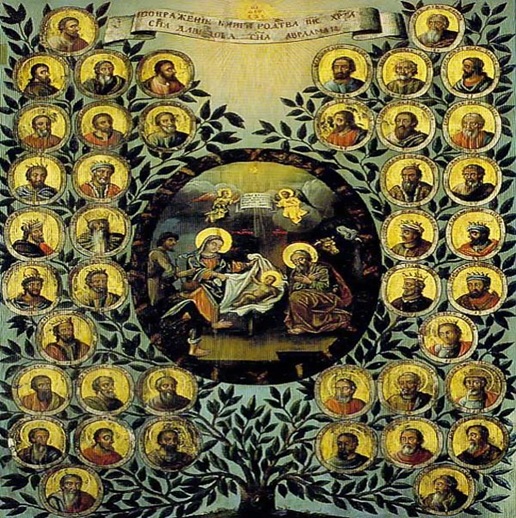The Achievement of Faith (11th Sunday of Luke- of the Forefathers) [2]
11 December 2022[Previous post: https://bit.ly/31WtMPI]
Now we proceed with the same faith, which is no longer abstract, however, because the promises have come, the fullness of time has arrived, the incarnation of the Word of God has occurred and the ‘angel of great counsel’ has appeared (Is. 9, 6). Our faith is focused, because the Only-Begotten Son of God has come. We’ve seen Him, we’ve touched Him, we’ve heard Him and we already possess Him. Now, with us, faith is something more. It’s no longer the simple faith of the Forefathers, who expected that, in accordance with His promise, God would come at some time and would save their descendants and the whole of humankind in general. We’ve gone beyond the limits of this introductory faith and have entered a higher form of faith, with the actual presence of the promise of God.
Now with this wide-open outlook, with no fear of anything ever, we’re convinced that, since the Lord has called us and we’re now on the strait and narrow path which ascends to Golgotha, we will see the resurrection.

The various adversities and temptations we encounter, whether they’re from Satan or from the many other things in our life, aren’t any threat to us, an obstacle barring our way, or a cause for doubt, but are the secret, practical means by which the mystery of the Cross is wrought. They’re the ways through which we can demonstrate our proper faith, so that we can justify ourselves as regards His promises. When we see temptations, we rise to our full height and continue on our way, because their presence is a clear indication that Divine grace, which called us and set us on the path of knowledge, is with us at this time and is urging us towards the prize of betterment. What do we need now? Fortitude and patience.
Our fortitude and patience, however, increase enormously when the matter of the temptation has to do with love of our neighbor. This is where our attention should be concentrated. Because when Christ revealed the ‘New Creation’, after He’d shown our provenance in great detail and our relationship with God and His with us, He also decided to give us a new commandment: ‘A new commandment I give you, that you love one another’ (Jn. 13, 34). And, as you know from the interpretations of our Fathers, ‘Salvation is from our neighbor’. The fathers lay great stress on the fact that that the commandment of love is the summation of all the virtues and commandments. It’s not a free commandment that you can cultivate at will. For us, it’s a duty, because it’s our emblem, our insignia which proves where we came from and where we’re headed.
So, be watchful. Every commandment issued from the mouth of God is dogma for us. But the commandment of love is something more. Because, you see, this Jesus of ours, Who is the center of our love, is, by His very nature, reciprocal love: ‘God is love and those who abide in love abide in God, as God does in them (I Jn. 4, 16).
So there you are. If we want ‘to dwell in God and God to dwell in us’ there’s no other way and no other path than the notion of love. This is why you have to be on your toes as regards the tangled-web of misunderstandings, which are Satan’s handiest tools for causing confrontation and disagreement. Focus your attention on this, in particular. Rather than wound love, you’d do better to tear apart all before you. In the view of the Fathers, those who at fault as regards love are like the servant who smote Christ on the cheek.
We don’t mean that, supposedly, with ‘love’, with one word, we have prescribed and described our life as Christians. Because love is the result. Although we must be careful to observe all the commandments, we should focus particularly on this bond. Because, if we keep this commandment, you can be sure the Satan will be vanquished. It’s the ‘link to perfection’.






